- Home
- Isabel Allende
Kingdom of the Golden Dragon Page 3
Kingdom of the Golden Dragon Read online
Page 3
Tensing was seated in a cave larger than the others, the only one he could crawl into, a place undoubtedly used to hold something like a tribal council. Dil Bahadur and Grr-ympr sat on either side of the lama, and gradually the other Yetis arrived, some so weak they could barely drag themselves across the ground. The ones that had met them with threatening stones and clubs were the warriors of that pathetic group. They stayed outside to stand guard, never for an instant putting down their weapons.
One by one the Yetis filed in, some twenty in total, not counting the dozen warriors. They were nearly all females, and, to judge by their hide and teeth, they seemed young, but very ill. Tensing examined each one, treating them with great respect in order not to frighten them. The last five were carrying babies, the tribe’s only surviving offspring. They did not have the repugnant appearance of the adults; they looked like little, white, loose-jointed monkeys. They were limp; they couldn’t hold up their heads or move their limbs; their eyes were shut tight and they were barely breathing.
Moved, Dil Bahadur saw that these creatures loved their children as much as any other mother. They held their babies in their arms tenderly, sniffed and licked them, snuggled them to their breasts to nurse them, and moaned with anguish when the infants did not react.
“It is very sad, master. They are dying,” the youth observed.
“Life is filled with suffering. Our mission is to relieve it, Dil Bahadur,” Tensing replied.
The light in the cave was so weak, and the odor so unbearable, that the lama motioned them all outside, where the tribe gathered again. Grr-ympr attempted a few steps of a healing dance around the sick babies, uttering chilling cries and making her bone-and-teeth necklaces clatter. The Yetis accompanied her with a chorus of moans.
Ignoring the uproar of wailing around him, Tensing bent over the children. Dil Bahadur watched his master’s expression change, as it usually did when he was using his curative powers. The lama picked up one of the smallest babies, which fit comfortably in the palm of his hand, and examined it intently. Then he approached one of the mothers, making friendly gestures to calm her, and studied a few drops of her milk.
“What is happening to the children?” the prince asked.
“Possibly they are dying of hunger,” said Tensing.
“Hunger? Their mothers aren’t feeding them?”
Tensing pointed out that the Yetis’ milk was a yellow, transparent liquid. Then he called the warriors, who did not want to respond until Grr-ympr grunted an order, and the lama examined them as well, paying particular attention to their purple tongues. The only one whose tongue was not that color was the ancient Grr-ympr. Her mouth was a dark, evil-smelling pit that did not invite close inspection, but Tensing was not a man to back away from unpleasantness.
“All the Yetis are undernourished except for Grr-ympr, whose only symptoms are those of advanced age. I calculate that she must be a hundred,” the lama concluded.
“What has changed in the valley? Why don’t they have enough food?” the prince asked.
“Perhaps they have food; they may simply be ill and not assimilating what they eat. The babies depend on their mother’s milk, which is not rich enough to nourish them; it’s like water, and that is why they are dying at the age of a few weeks or months. The adults have more resources because they eat meat and plants, but something has weakened them.”
“Which is why they’ve been getting smaller and dying young,” suggested Dil Bahadur.
“Possibly.”
Dil Bahadur rolled his eyes; sometimes his master’s vagueness made him crazy.
“This is a problem that has developed during the last two generations, because Grr-ympr remembers when the Yetis were as tall as she is. At this rate, they probably will disappear in a few years,” said the prince.
“Possibly,” the lama replied for the hundredth time; he was thinking about something else. He added, “Grr-ympr also could remember when they had moved to this valley. That may mean that there is something harmful here, something that is destroying the Yetis.”
“That must be it! Can we save them, master?”
“Perhaps . . .”
The monk closed his eyes and prayed for a few minutes, asking for inspiration to resolve the problem and for humility to understand that the result was not in his hands. He would do the best he could, but he could not control life or death.
At the end of his short meditation, Tensing washed his hands, then went to one of the corrals. There he picked out a female chegno and milked it. He filled his bowl with warm, foaming milk, and carried it back to the infants. He wet a rag in the milk and placed it to the lips of one of the babies. At first the child did not react, but after a few seconds the smell of the milk stirred it; its lips opened, and it began weakly to suck the rag. The lama gestured to the mothers that they should imitate him.
It was a long and tedious process to teach the Yetis to milk the chegnos and to feed the babies drop by drop. The Yetis had a minimal capacity for reasoning, but they were able to learn by repetition. The master and the disciple spent the whole day on the project, and they saw the results that same night when three of the babies cried for the first time. The next day all five were crying, asking for milk, and soon they opened their eyes and were able to move.
Dil Bahadur felt as proud as if the solution had been his idea, but Tensing didn’t stop there. He had to find an explanation. He studied everything the Yetis put in their mouths without coming upon the cause of their distress. Then he and his disciple themselves began to suffer stomach pains and vomit bile, although they had eaten only their usual tsampa. They hadn’t tried the chegno meat the Yetis offered them, because they were vegetarians.
“What have we eaten that is different, Dil Bahadur—the one thing?” the master asked as he prepared a medicinal tea for their digestion.
“Nothing, master,” the youth replied, pale as death.
“It has to be something,” Tensing insisted.
“All we have eaten is our tsampa, not a bite of anything else . . .” the prince murmured.
Tensing passed the bowl with the tea to Dil Bahadur, who, doubled over with pain, put it to his lips. But he stopped short before he swallowed, spitting the liquid into the snow.
“The water, master! It’s the hot water!”
Normally they boiled water or snow to prepare their tsampa and their tea, but in the valley they had been using the boiling water from one of the many thermal springs bubbling from the ground.
“That’s what is poisoning the Yetis, master,” the prince insisted.
They had seen them use the lavender-colored water from the thermal spring to make the soup of mushrooms, herbs, and purple flowers that served as the basis of their diet. Grr-ympr, however, had lost her appetite over the years, and every two or three days she ate only a little raw meat; when she was thirsty she stuffed handfuls of snow into her mouth. The thermal water—which obviously contained toxic minerals—was what they themselves had used to brew their tea. For the next few hours they avoided it completely, and the discomfort that had been tormenting them ended. To be certain that they had found the source of the problem, the next day Dil Bahadur brewed tea with the suspected water and drank it. He was soon vomiting, but happy to have proved his theory.
Practicing great patience, the lama and his disciple informed Grr-ympr that the lavender-colored water must be strictly prohibited, along with the purple flowers that grew on the banks of the stream. The thermal water could be used for bathing but not for drinking or preparing food, they told her. They didn’t bother to explain that it contained harmful minerals, because the ancient Yeti would not have understood; it would be enough that the Yetis would honor her instructions. Grr-ympr made her task easy. She called her subjects together and notified them of a new law: Anyone who drank that water would be thrown into a fumarole. Understood? They all understood.
The tribe helped Tensing and Dil Bahadur collect the medicinal plants they needed. Throughout the w
eek they stayed in the Valley of the Yetis, the visitors were able to watch the babies’ health improve every day and see that the adults were growing stronger in direct ratio to how fast the purple faded from their tongues.
Grr-ympr personally accompanied the lama and his disciple when the moment came to leave. She watched them start in the direction of the canyon they’d come through when they arrived. After some hesitation, because she feared revealing the Yeti’s secrets even to these gods, she motioned that they should follow her in the opposite direction. For more than an hour the lama and the prince walked behind her along a narrow path that wove among the columns of vapor and pools of boiling water, leaving the primitive village of the Yetis behind.
The sorceress led them to the edge of the volcanic plain, pointed to an opening in the mountain, and told them that from time to time the Yetis used that pass to go out in search of food. Tensing understood what she was telling them: This was a shortcut in the form of a natural tunnel. The mysterious valley was much closer to civilization than anyone had supposed. The parchment Tensing carried with him indicated the only route known to the lamas, which was much longer and filled with many more obstacles, but no one knew of this secret pass. As he found its location on the parchment, Tensing realized that the tunnel descended straight down into the mountain and came out near Chenthan Dzong, the ruined monastery. This route would save them two-thirds of their original trek.
Grr-ympr bid them farewell in the only way she knew how to show affection: She licked their faces and hands until they were wet with saliva and mucus.
The instant the horrible priestess turned to start back, Dil Bahadur and Tensing rolled in the snow to cleanse themselves. The master was laughing, but the disciple was barely able to keep from throwing up.
“Our only consolation is that we will never see that fine lady again,” the youth commented.
“Never is a long time, Dil Bahadur. Possibly life has a surprise in store for us,” the lama replied, stepping with determination into the narrow tunnel.
CHAPTER THREE
Three Fabulous Eggs
ON THE OTHER SIDE OF THE WORLD, Alexander Cold was arriving in New York, accompanied by his grandmother Kate. The sun of the Amazon had burned the American boy the color of wood. He wore his hair Indian-style: a bowl cut with a shaved circle on the crown of his head, and in that circle was a new scar. He had his filthy backpack over his shoulder, and he carried a bottle of milky liquid. Kate Cold, as tanned as her grandson, was dressed in her usual khaki shorts and mud-caked shoes. Her gray hair—which she herself cut without looking in the mirror—gave her the look of a Mohican that had just been rudely awakened. She was tired, but her eyes glittered behind broken glasses held together with tape. Her luggage consisted of a tube about six feet long and an assortment of bundles of uncommon shapes and sizes.
“Do you have anything to declare?” the immigration officer inquired, throwing a disapproving look at Alex’s strange haircut and at his grandmother’s general appearance.
It was five in the morning, and the man was as tired as the air passengers who had just flown in from Brazil.
“Nothing. We’re reporters for International Geographic. All we’re carrying is equipment for our work,” Kate Cold replied.
“Fruit? Vegetables? Food?”
“Just this ‘water of health’ to cure my mother,” said Alex, showing the man the bottle he had hand-carried throughout the trip.
“Pay no attention to him, officer, this boy has a big imagination,” Kate interrupted.
“What is that?” the official asked, pointing to the tube.
“A blowgun.”
“A what?”
“That’s a kind of hollow cane the Indians of the Amazon use to shoot darts poisoned with . . .” Alexander started to explain before his grandmother silenced him with a kick.
The man was distracted and didn’t ask any further questions, so he never learned about the quiver containing the darts or the gourd holding the deadly curare poison, which were wrapped in other bundles.
“Anything more?”
Alexander looked in the pockets of his jacket and pulled out three glass balls.
“What are those?”
“I believe they’re diamonds,” the boy said and immediately received another sharp kick from his grandmother.
“Diamonds. That’s a good one! What have you been smoking, boy?” the official exclaimed, laughing out loud as he stamped their passports and waved them on.
When they opened the door of Kate’s apartment in New York City, a blast of fetid air struck Kate and Alexander in the face. The writer clapped a hand to her head. It wasn’t the first time she’d gone on a trip and left the garbage in the kitchen. They stumbled inside, holding their noses. While Kate organized their luggage, her grandson opened the windows and took charge of the garbage, which had already sprouted flora and fauna. When at last they succeeded in finding a place for the blowgun in the tiny apartment, Kate collapsed feet-out on the sofa, and sighed. She was afraid that she was beginning to feel the weight of her sixty-some years.
Alexander took the round stones from his jacket and put them on the table. His grandmother gave them an indifferent glance. They looked like those glass paperweights tourists buy.
“They are diamonds, Kate,” the boy informed her.
“Right! And I’m Marilyn Monroe,” the writer answered.
“Who?”
“Awghh,” she groaned, horrified at the generational abyss that separated her from her grandson.
“That must be someone from your time,” Alexander suggested.
“This is my time! This is more my time than yours. At least I don’t live on another planet, the way you do,” his grandmother grumbled.
“No, really, they’re diamonds, Kate,” Alexander insisted.
“Fine, Alexander, they’re diamonds.”
“Could you call me Jaguar? That’s my totemic animal. The diamonds don’t belong to us, Kate. They belong to the People of the Mist. I promised Nadia we would use them to protect the Indians.”
“Yeah, yeah, yeah,” she mumbled, paying no attention to her grandson.
“We can use these to finance the foundation you and Professor Leblanc are planning to set up.”
“I think that blow to your head shook a few screws loose, child,” Kate replied, absentmindedly putting the crystal eggs into her jacket pocket.
In weeks to come, the writer would have reason to revise her opinion of her grandson.
Kate had the crystal eggs in her possession for two weeks, completely forgetting about them until she moved her jacket from a chair and one of the stones fell on her foot, crushing her toes. By that time her grandson, Alexander, was back at his parents’ home in California. The writer limped around several days with bruised toes and the eggs in her pocket, sometimes unconsciously playing with them. One morning she went to get a cup of coffee at a shop on her block and left one of the “diamonds” on the table. The owner, an Italian she had known for more than twenty years, caught up with her at the next corner.
“Kate! You left this glass ball!” he shouted, tossing it to her over the heads of the other pedestrians.
She caught it and kept walking, with the thought that it was time to do something about those eggs. With no plan in mind, she headed for the street in midtown that was lined with jewelers’ shops, where she found herself before the door of a store owned by an old love of hers, Isaac Rosenblat. Forty years before, they had been close to getting married, but Joseph Cold had come along and seduced Kate by playing his flute for her. Kate was sure that the flute was magic. Within a short time Joseph Cold had become one of the most famous musicians in the world. “The same flute my foolish grandson left somewhere in the Amazon,” Kate thought, furious. She had given Alexander’s ear a good twist when he lost his grandfather’s magnificent instrument.
Isaac Rosenblat was a pillar of the Jewish community, rich, respected, and the father of six children. He was one of those ea
sygoing people who fulfill their responsibilities with no fuss and whose soul is at peace, but when he saw Kate Cold walk into his shop he felt himself sinking into a morass of memories. In one instant he was again the shy young man who had loved this woman with the desperation of first love. In those days Kate had been a girl with porcelain skin and an untamed red mane; now she had more wrinkles than a parchment, and the gray hair she cut with scissors was standing up like straw in a broom.
“Kate! You haven’t changed, my girl, I’d pick you out in any crowd,” he murmured with heartfelt emotion.
“Don’t lie, you shameless old sweet-talker,” she replied, feeling flattered despite herself and dropping her knapsack, which thudded to the floor like a sack of potatoes.
“You’ve come to tell me that you made a mistake and to ask me to forgive you for having left me with a broken heart, isn’t that it?” the jeweler joked.
“You’re right, I made a mistake, Isaac. I wasn’t cut out for wedded bliss. My marriage to Joseph lasted only a short time, but at least we had a son, John. Now I have three grandchildren.”
“I knew that Joseph had died, I’m truly sorry. I was always jealous of him, and I never forgave him for taking my sweetheart away from me, but I bought all his records anyway. I have the complete collection of his concerts. He was a genius.”
The jeweler offered Kate a seat on a dark leather sofa, and made himself comfortable at her side. “So you’re a widow now?” he added, studying her affectionately.
“Don’t get any ideas, I haven’t come looking for sympathy. Or to buy jewelry. Jewels aren’t my style,” Kate replied.
“I can see that,” Isaac Rosenblat noted, casting a sideways glance at her wrinkled trousers and combat boots, and the travel backpack she set on the floor.
“I want to show you these glass pieces,” she said, taking the eggs from her jacket.

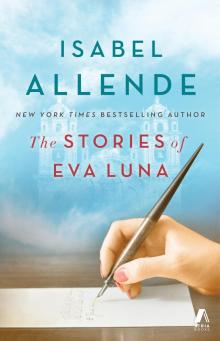 The Stories of Eva Luna
The Stories of Eva Luna The House of the Spirits
The House of the Spirits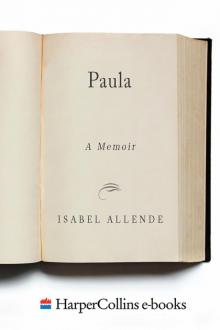 Paula
Paula Ines of My Soul
Ines of My Soul Of Love and Shadows
Of Love and Shadows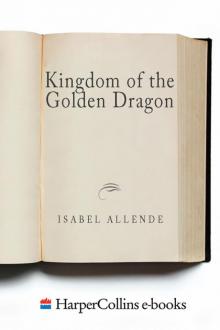 Kingdom of the Golden Dragon
Kingdom of the Golden Dragon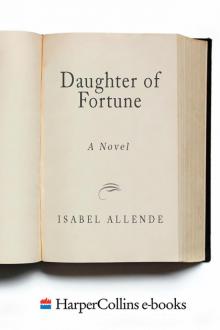 Daughter of Fortune
Daughter of Fortune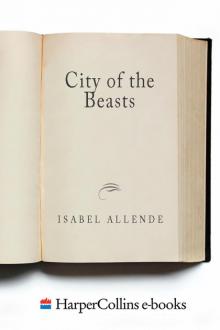 City of the Beasts
City of the Beasts Maya's Notebook
Maya's Notebook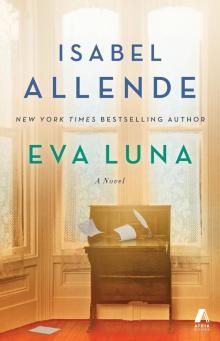 Eva Luna
Eva Luna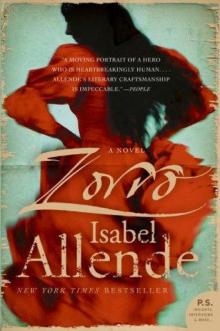 Zorro
Zorro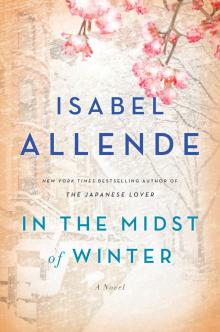 In the Midst of Winter
In the Midst of Winter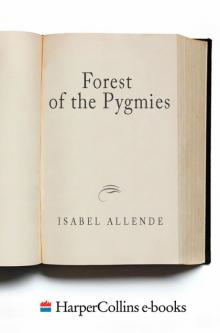 Forest of the Pygmies
Forest of the Pygmies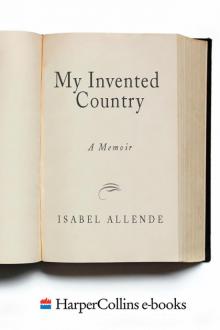 My Invented Country: A Nostalgic Journey Through Chile
My Invented Country: A Nostalgic Journey Through Chile The Japanese Lover
The Japanese Lover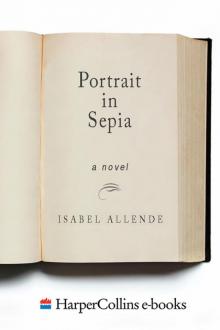 Portrait in Sepia
Portrait in Sepia Island Beneath the Sea
Island Beneath the Sea The Soul of a Woman
The Soul of a Woman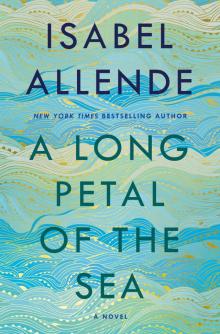 A Long Petal of the Sea
A Long Petal of the Sea Ines of My Soul: A Novel
Ines of My Soul: A Novel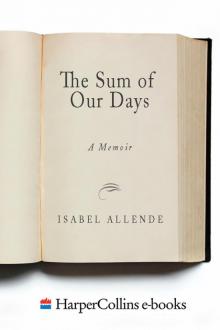 The Sum of Our Days
The Sum of Our Days